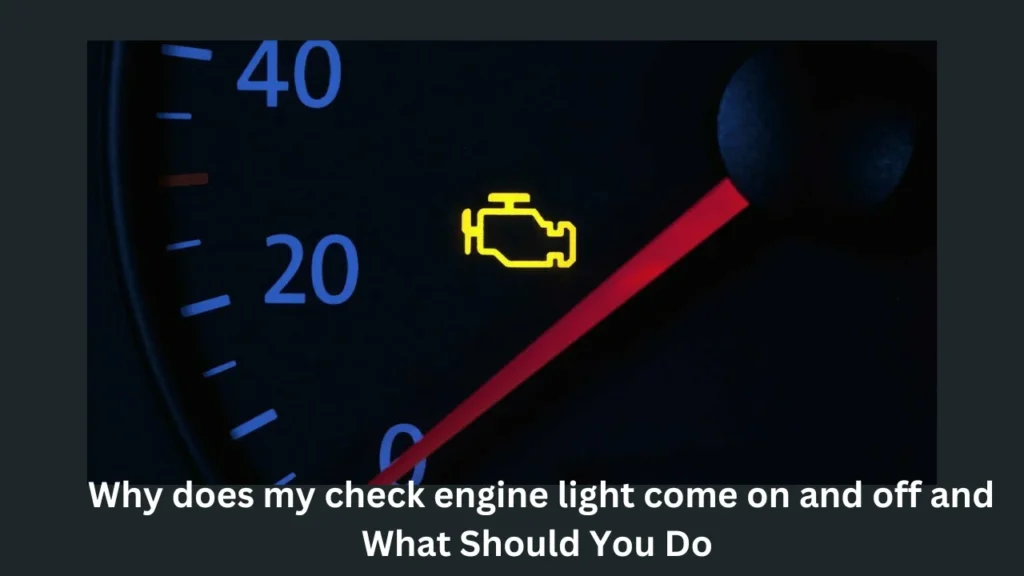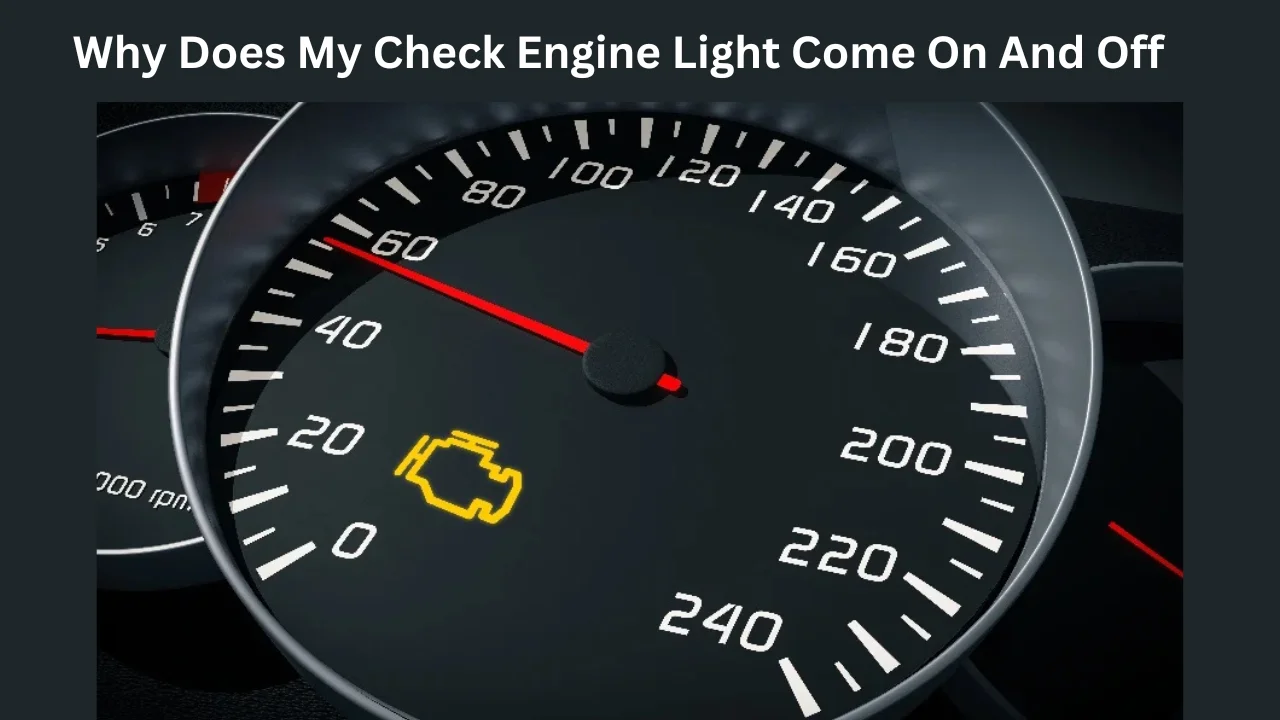Why Does My Check Engine Light Come On And Off
The check engine light (CEL) in your car can be one of the most puzzling signals to understand as it flickers on and off. It’s common for drivers to see the check engine light illuminate, only for it to disappear after a short while. But what does this mean? why does my check engine light come on and off? In this article, we’ll explore the reasons behind the flickering check engine light and help you understand why it behaves this way. We’ll also cover what steps you should take if you encounter this issue, and when to seek professional help.
What is the Check Engine Light?
The check engine light is a warning system in your vehicle’s dashboard that alerts you to issues related to your engine or emissions system. This light is part of your car’s On-Board Diagnostics II (OBD-II) system, which monitors the performance of the engine, exhaust, fuel system, and more. When a problem is detected, the system triggers the check engine light to inform you that something isn’t working correctly.
Typically, the light can indicate minor problems like a loose gas cap, but it can also point to more serious issues such as a failing catalytic converter or engine misfire. So, why does my check engine light come on and off? This behavior often points to certain causes we will explore in detail.
ALSO READ: Do Crabs Have Eyebrows Anatomy Functions And Behavior
Common Reasons why does my check engine light come on and off
Loose or Faulty Gas Cap
One of the most common and easiest reasons for a check engine light to come on and off is a loose or faulty gas cap. The gas cap helps maintain the proper pressure inside your fuel system and ensures that gasoline vapors do not escape into the environment. If the cap is loose, damaged, or not sealed correctly, it can cause a pressure leak, which triggers the check engine light.
Often, this issue can resolve itself once the gas cap is tightened. However, if the cap is damaged, it may need to be replaced. A loose gas cap doesn’t always keep the light on, and sometimes it may flicker on and off, especially if the pressure changes periodically.
Malfunctioning Oxygen Sensor
Your vehicle’s oxygen sensor monitors the level of oxygen in the exhaust gases, allowing the engine control unit (ECU) to adjust the air-to-fuel ratio for optimal engine performance. If this sensor fails or starts to give inaccurate readings, it can cause the check engine light to appear intermittently.
A malfunctioning oxygen sensor may lead to poor fuel efficiency and higher emissions. The light may turn off if the sensor corrects itself temporarily, but in the long run, the sensor will likely need to be replaced to prevent further engine performance issues.
Spark Plugs or Ignition Coil Issues
Spark plugs play a crucial role in igniting the fuel mixture in the engine’s cylinders. When these components begin to fail, your vehicle may experience engine misfires, causing the check engine light to come on and off. Worn or faulty spark plugs can lead to rough idling, poor acceleration, and increased fuel consumption.
In some cases, the ignition coil (which supplies power to the spark plugs) may also malfunction, triggering similar issues. If the check engine light flickers on and off, it is often a sign that a spark plug or ignition coil issue is present. Replacing the damaged components should resolve the problem.
Mass Air Flow Sensor Problems
The Mass Air Flow (MAF) sensor is responsible for measuring the amount of air entering the engine, which helps determine the appropriate fuel-air mixture. If the MAF sensor becomes dirty or fails, it can affect the engine’s performance and cause the check engine light to illuminate intermittently.
A failing MAF sensor can also cause your car to experience poor acceleration, rough idle, or even stalling. In most cases, cleaning the MAF sensor can resolve the issue. However, a replacement may be necessary if the sensor is beyond cleaning.
Catalytic Converter Issues
A catalytic converter is an essential component of your vehicle’s exhaust system. It helps reduce harmful emissions by converting carbon monoxide into harmless carbon dioxide. If the catalytic converter is clogged, damaged, or malfunctioning, it can trigger why does my check engine light come on and off.
A failing catalytic converter can cause engine performance problems, including reduced acceleration and lower fuel efficiency. Since these issues often escalate over time, it’s important to address catalytic converter problems promptly. In some cases, the light may turn on and off depending on the condition of the converter.
Loose or Damaged Wiring and Connections
Electrical problems, such as loose, corroded, or damaged wiring, can cause why does my check engine light come on and off to turn on intermittently. Your vehicle’s sensors, which are responsible for providing data to the ECU, are connected by wires. If these wires become damaged or disconnected, it can lead to faulty signals that trigger the light.
When wiring issues occur, the check engine light may come on and off randomly. If you notice this, it’s important to have a mechanic inspect your vehicle’s electrical system and fix any issues with the wiring or connections.
Transmission Problems
In some cases, the check engine light can be triggered by transmission issues. Transmission problems, such as low fluid levels or overheating, can cause why does my check engine light come on and off. These issues are often accompanied by symptoms like rough shifting, delayed acceleration, or strange noises coming from the transmission.
Transmission problems should not be ignored, as they can cause more severe damage if left unresolved. Regular transmission fluid checks and timely fluid replacements can help prevent transmission issues from triggering the check engine light.
Other Potential Causes
Other factors that can cause the check engine light to flicker on and off include issues with the exhaust gas recirculation valve (EGR), the fuel pressure regulator, or the vacuum hoses. If any of these components are malfunctioning, the ECU will detect it and illuminate the light.
In some cases, the check engine light may turn on and off due to a temporary issue that doesn’t require immediate attention. However, it’s always a good idea to have your car checked to avoid overlooking a potential problem.
ALSO READ: Noel J. Mickelson Life Age Career And Relationship
Most common diagnostic steps:
| Diagnostic Step | Possible Cause |
|---|---|
| OBD-II Scan | Checks for error codes related to the engine and sensors |
| Visual Inspection of Wiring | Identifies loose or damaged wiring connections |
| Spark Plug Inspection | Checks for worn-out or faulty spark plugs |
| MAF Sensor Cleaning/Replacement | Ensures the sensor is functioning correctly |
| Gas Cap Check | Ensures proper sealing and no damage |
| Transmission Fluid Check | Ensures the fluid is at the correct level and is clean |
Why does my check engine light come on and off and What Should You Do

Why does my check engine light come on and off, it’s essential not to ignore it, as it could indicate an underlying issue that could worsen over time. Here’s what you should do:
Check the Gas Cap:
Ensure the gas cap is properly tightened and not damaged. A loose gas cap is one of the easiest and most common causes of the check engine light.
Monitor Your Vehicle’s Performance:
Pay attention to any changes in engine performance, such as rough idling, loss of power, or unusual sounds.
Scan for Trouble Codes:
Using an OBD-II scanner, you can read the error codes from your vehicle’s diagnostic system. This will give you more insight into what might be causing the issue.
Visit a Mechanic:
If the light keeps coming on and off or if you notice a decline in performance, it’s time to have a professional mechanic inspect the vehicle. They can diagnose and repair the problem to ensure your car stays in optimal condition.
Diagnosing and Fixing the Issue
Why does my check engine light come on and off, a mechanic will likely use an OBD-II scanner to retrieve the error codes stored in your vehicle’s computer. These codes will provide valuable information regarding which component of the engine or emissions system is malfunctioning. Once the issue is identified, the mechanic will be able to recommend the necessary repairs, whether it’s replacing a spark plug, cleaning a sensor, or fixing electrical connections.
Frequently Asked Questions
Why does my check engine light come on and off?
The check engine light can come on and off due to minor issues like a loose gas cap or a more serious problem such as a faulty oxygen sensor or spark plugs. It’s important to have it checked to avoid bigger issues.
Should I ignore the check engine light if it goes off?
No, you should not ignore the check engine light, even if it goes off. It could indicate a problem that needs attention, and addressing it early can prevent further damage.
Can I fix the check engine light myself?
You can check simple issues like a loose gas cap, but for most problems, it’s best to have a mechanic diagnose and fix the issue using a diagnostic tool.
Conclusion
The question of why does my check engine light come on and off can be explained by various issues, ranging from minor problems like a loose gas cap to more serious concerns like transmission failure or a malfunctioning catalytic converter. Although it’s easy to dismiss the check engine light when it goes off again, it’s crucial to address the root cause promptly. Whether the issue is simple or complex, ignoring the light can lead to more expensive repairs in the future.

